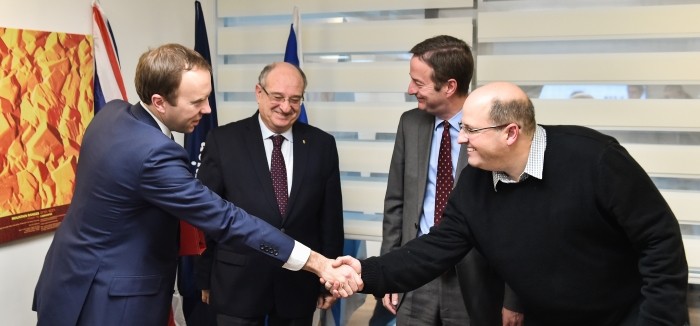UK Minister Matt Hancock at Technion
UK Minister Matt Hancock at Technion
UK – Technion alliances to counter Parkinson’s and heart disease
British Minister of State for Digital and Culture Policy visits the Technion: “The cooperation with your researchers is already bearing practical fruit”
“I was deeply impressed by the labs that I visited today at the Technion, labs that are cooperating with British scientists as part of BIRAX (the Britain Israel Research and Academic Exchange Partnership).” So said Matt Hancock, the British Minister of State for Digital and Culture Policy, on a visit to the Technion. Hancock visited the campus as head of a senior delegation from Britain, along with the British Ambassador to Israel, Mr. David Quarrey.
The British delegation met with Technion President Prof. Peretz Lavie; Dr. Yoav Broza from the laboratory of Prof. Hossam Haick; and Prof. Lior Gepstein.
“Globalization is one of our main goals today,” Prof. Lavie told the delegation. “That’s why we have international programs in engineering and medicine, and that’s why we have established extensions branches in New York and Shantou, China. Cooperation with Britain is very important to us because Israel and Britain are two countries that excel in scientific research, and the connection between our researchers and yours has vast potential.”

Minister Hancock with Technion President Prof. ,Peretz Lavie, British Ambassador to Israel, Mr. David Quarrey and Prof. Lior Gepstein.
BIRAX promotes joint studies by researchers from Israel and Britain in order to cope with serious and challenging diseases, including Parkinson’s, diabetes and cardiovascular disease. Last year, the British Embassy and the British Council chose eight such joint studies, which will receive support totaling over £7 million. Researchers at the Technion are involved in three of the selected studies:
The first is a focus to establish the most suitable cells for rebuilding heart tissue, with Prof. Joseph Itzkowitz-Eldor of the Technion’s Rappaport Faculty of Medicine and Prof. Bruno Pollet of the University of Edinburgh. The aim of the study is to develop an effective treatment for coronary heart disease (CAD), which is the main cause of heart attacks.
The second is the accelerated development of biological pacemakers, through a collaboration between Prof. Lior Gepstein of the Technion’s Rappaport Faculty of Medicine and Prof. Chris Denning of the University of Nottingham. The researchers are developing biological pacemakers based on heart cells grown in the lab, leveraging the effect of light on the pulse rate. The goal: rehabilitation of patients with arrhythmia.
The third area is the development of a breath test for the early diagnosis of Parkinson’s disease. Prof. Hossam Haick of the Technion’s Wolfson Faculty of Chemical Engineering and Prof. Roger Barker of the University of Cambridge are collaborating on the project. In this study, the unique technology developed by Prof. Haick for the rapid diagnosis of various diseases is being adapted to diagnose Parkinson’s. This is a non-invasive test, based on an analysis of the patient’s breath, and its effectiveness in diagnosing Parkinson’s disease has already been demonstrated in a preliminary study.
Hancock noted that he is: “Very excited to see how the Israeli-British cooperation is bearing practical fruit. The connection with the Technion researchers is very important to us, and its importance is only increasing in the wake of Brexit. The British Government intends to increase its investment in scientific research, including its investment in joint research with scientists from other countries.”


